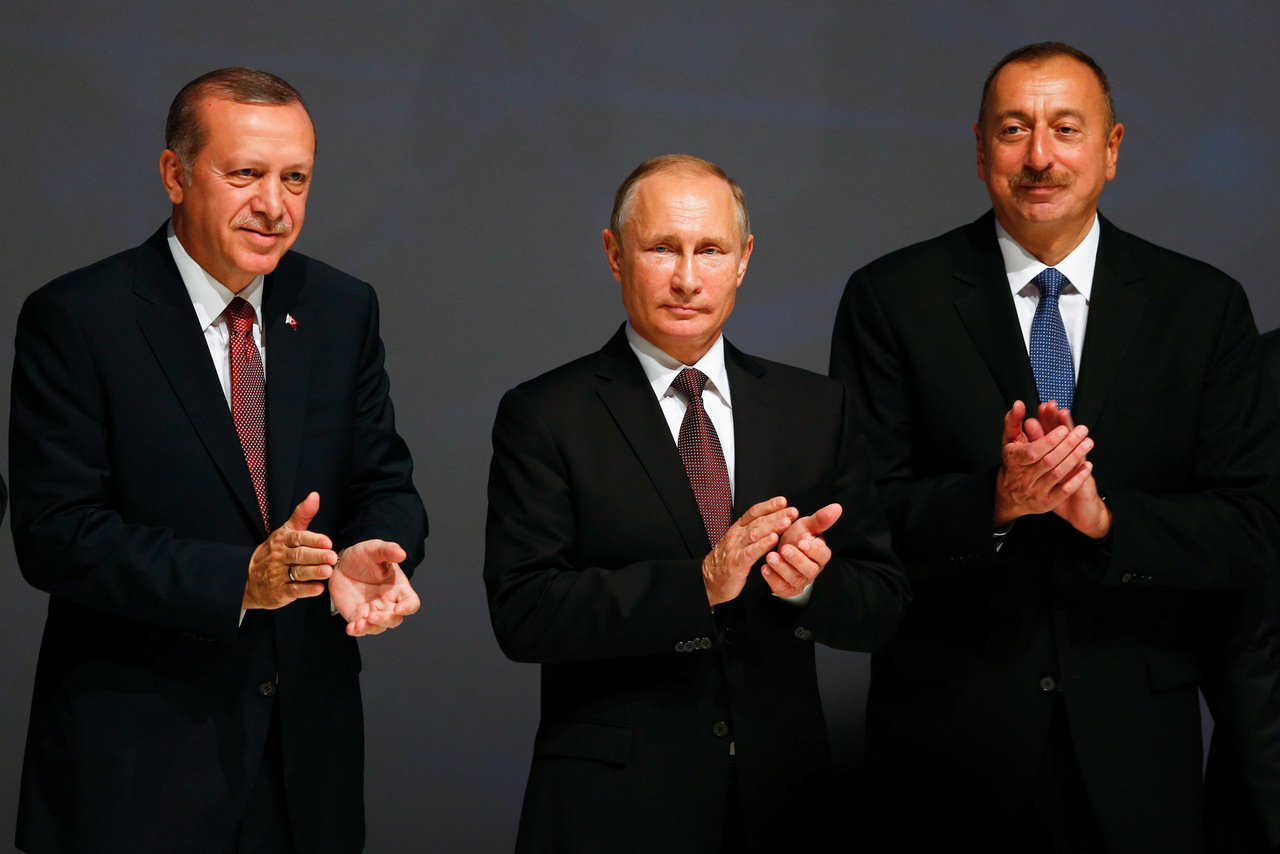Türkiye Strengthens Influence in South Caucasus after Fall of Nagorno-Karabakh
Azerbaijan regaining control of Nagorno-Karabakh strengthens Türkiye’s position in the South Caucasus. The possible opening of the Zangezur transport corridor, which would give Türkiye land access to the Caspian region and Central Asia, will hinder Turkish-Armenian normalisation. It will also deepen Iran’s distrust of the Turkish authorities. Continued tension in the South Caucasus will have a negative impact on the EU’s leverage in the region.
 Murad Sezer / Reuters / Forum
Murad Sezer / Reuters / Forum
Turkish policymakers have consistently sought to strengthen Türkiye’s position in Central Asia and the South Caucasus. Their aim is to reduce the importance of Russia and Western countries in the region by expanding their own influence, re-establishing diplomatic relations with Armenia, and creating direct trade routes to Azerbaijan and the linguistically related countries in Central Asia. This is to be served by the creation of the Zangezur transport corridor, a transit route linking Azerbaijan to Türkiye via the Azerbaijani exclave of Nakhichevan and Sjunik, the southern province of Armenia. The realisation of the project would serve the interests of both the Turkish and Azerbaijani authorities, who point to benefits for the entire region in terms of trade and tourism development, among others. The realisation of the corridor is opposed by the Armenian authorities, citing its extraterritoriality which would mean the loss of Armenia’s sovereignty over part of its territory.
Turkish-Azerbaijani Partnership
Cooperation between Türkiye and Azerbaijan—a Turkic nation with a Shiite majority—is shaped by the slogan “one nation, two states” (tek millet, iki devlet), which expresses an awareness of the ethnic, cultural, and linguistic commonality between the two countries. The relationship with Türkiye at the forefront is also cemented by the leaders’ friendly relationship. For Türkiye, Azerbaijan is its closest ally in the Caucasus, as demonstrated by President Recep Tayyip Erdoğan’s statement in June this year that the Turkish side aims to transform bilateral relations into an “institutionalised model of economic and political integration”.
The alliance between the two countries was formalised with the signing of the Shusha Declaration by Erdoğan and Azerbaijani President Ilham Aliyev on 15 June 2021. The most important commitment expressed in it is cooperation in the event of a threat or attack on the territorial integrity of either party. Energy cooperation is also an important aspect of bilateral relations. In 2022, Azerbaijan was third (after Russia and Iran) in the supply of gas to Türkiye. Azerbaijani gas is exported through pipelines such as the Baku-Tbilisi-Ceyhan line and the Trans-Anatolian Pipeline (TANAP)—established in 2018, it flows to Europe.
According to Turkish policymakers, the successful military offensives by Azerbaijani forces in Nagorno-Karabakh in 2020 and in September this year represent a success for Turkish foreign policy. Following the formalisation of the Turkish-Azerbaijani alliance by Erdoğan and Aliyev, the image of the two countries’ community has been strengthened. The Nagorno-Karabakh Republic will cease to exist at the end of the year, but Türkiye will continue its arms cooperation with the Azerbaijani authorities.
International Dimension
In addition to Türkiye, the countries of Iran and Russia are also involved in the competition for influence in the post-Nagorno-Karabakh Republic South Caucasus. Although the Turkish, Russian, and Iranian governments have proven that they can cooperate tactically despite political differences, as exemplified by Syria, Türkiye’s support for Azerbaijan’s military operations in the region in 2020 and 2023 has intensified Iran’s distrust of the Turkish authorities. From Iran’s perspective, Türkiye’s cooperation with Azerbaijan is an expression of Türkiye’s growing regional ambitions. The Iranian authorities are divided over the Zangezur Corridor. Supporters of the project believe that Iran could benefit from greater commercial and political integration after its implementation. Opponents of the initiative, including former Iranian Foreign Minister Kamal Kharazi, believe that the corridor would lead to an expansion of NATO influence, which could weaken Iran’s economic and political position in the region in the long term. Russia, on the other hand, supports the Turkish-Azerbaijani plans to create the corridor, even at the cost of Armenia ceding part of its territory. The Russian government’s stance stems from its dislike of Armenian Prime Minister Nikol Pashinyan, who advocates a pro-Western reorientation of Armenian foreign policy. The Russians also see the expansion of transport links through Armenian territory as an opportunity to bypass Western sanctions imposed on Russia.
Türkiye, while supportive of the idea of the corridor despite Armenia seeing it as a threat, also seeks to restore diplomatic relations with the country. The first steps towards normalisation were taken by the Turkish authorities in 2021 when Erdoğan appointed Serdar Kılıç, a former Turkish ambassador to the U.S., to negotiate with the Armenian side. This met with the approval of the Armenian authorities, who entrusted the position of special envoy for the normalisation process to Ruben Rubinyan, vice-president of the Armenian parliament. This has brought positive results, as evidenced by, among other things, Armenia’s decision to lift the embargo on Turkish goods, as well as the opening of the land border between Türkiye and Armenia to third-country nationals. Pashinyan’s presence at Erdoğan’s swearing-in ceremony as president in June this year was also a sign of progress in the normalisation process. Despite the harbingers of positive changes in bilateral relations, one obstacle in this process is the deteriorating Turkish-French relations, shaped by the influence of the Armenian diaspora in France. The French, who supported the Armenian authorities during the 2020 war, accused Türkiye of sending mercenaries from Syria to fight on the side of Azerbaijan. After the collapse of Nagorno-Karabakh, France opposed Erdoğan’s participation in the Aliyev-Pashinyan negotiations at the European Political Community (EPC) summit in Granada, despite demands from Azerbaijan, which in effect also refused to attend the meeting. Türkiye’s exclusion from the talks was a mistake, as there was no direct meeting between representatives of Armenia and Azerbaijan, thus dismissing the possibility of a peaceful settlement of the situation in the South Caucasus.
Conclusions and Outlook
A factor that will work in favour of further strengthening Türkiye’s position in the South Caucasus is the weakening of Russia’s ability to influence the region as a peacemaker and security guarantor, due to its military involvement on the Ukrainian front and its lack of support for Armenia. This overlaps with the EU’s passive stance towards the Azerbaijani offensive in September.
Although Azerbaijan’s assumption of control of Nagorno-Karabakh has put Türkiye in a privileged position in the competition for influence in the South Caucasus, the Turkish authorities nevertheless want to ensure that the course of their foreign policy is not openly colliding with either Iran or Russia. They will therefore seek to continue transactional cooperation with both sides on economic and security levels.
Azerbaijan’s assumption of control of Nagorno-Karabakh does not resolve the dispute between Armenia and Azerbaijan, and the Zangezur transport corridor idea remains a divisive issue in the conflict. The prospect of a new war in the South Caucasus and the provision of support to Azerbaijan in the form of military equipment and intelligence could, on the one hand, help Türkiye to expand its influence, but on the other hand, it would harm the normalisation efforts initiated with Armenia, as well as jeopardise the stability enabling economic interests. Therefore, Turkish decision-makers may try to coerce the Armenian authorities into cooperating on the corridor by posing a scenario of Türkiye joining the war.
The strengthening Turkish-Azerbaijani alliance and Türkiye’s role in the South Caucasus will be a challenge for the EU. Although energy cooperation with Azerbaijan makes it possible to reduce dependence on Russian gas supplies, the EU does not have effective instruments to put pressure on the Azerbaijani authorities with regard to, for example, respect for human rights or the rule of law. Türkiye, on the other hand, sees EU diplomacy as pro-Armenian and does not wish to take the EU’s position into account or cooperate with it in the implementation of its policy in the South Caucasus.



.jpg)
.jpg)
